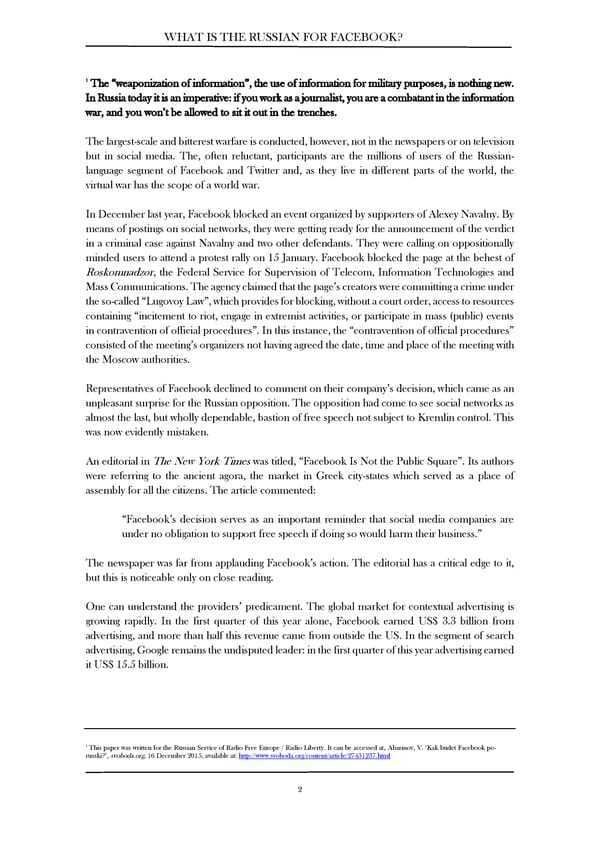WHAT IS THE RUSSIAN FOR FACEBOOK? 1 The “weaponization of information”, the use of information for military purposes, is nothing new. In Russia today it is an imperative: if you work as a journalist, you are a combatant in the information war, and you won’t be allowed to sit it out in the trenches. The largest-scale and bitterest warfare is conducted, however, not in the newspapers or on television but in social media. The, often reluctant, participants are the millions of users of the Russian- language segment of Facebook and Twitter and, as they live in different parts of the world, the virtual war has the scope of a world war. In December last year, Facebook blocked an event organized by supporters of Alexey Navalny. By means of postings on social networks, they were getting ready for the announcement of the verdict in a criminal case against Navalny and two other defendants. They were calling on oppositionally minded users to attend a protest rally on 15 January. Facebook blocked the page at the behest of Roskomnadzor, the Federal Service for Supervision of Telecom, Information Technologies and Mass Communications. The agency claimed that the page’s creators were committing a crime under the so-called “Lugovoy Law”, which provides for blocking, without a court order, access to resources containing “incitement to riot, engage in extremist activities, or participate in mass (public) events in contravention of official procedures”. In this instance, the “contravention of official procedures” consisted of the meeting’s organizers not having agreed the date, time and place of the meeting with the Moscow authorities. Representatives of Facebook declined to comment on their company’s decision, which came as an unpleasant surprise for the Russian opposition. The opposition had come to see social networks as almost the last, but wholly dependable, bastion of free speech not subject to Kremlin control. This was now evidently mistaken. An editorial in The New York Times was titled, “Facebook Is Not the Public Square”. Its authors were referring to the ancient agora, the market in Greek city-states which served as a place of assembly for all the citizens. The article commented: “Facebook’s decision serves as an important reminder that social media companies are under no obligation to support free speech if doing so would harm their business.” The newspaper was far from applauding Facebook’s action. The editorial has a critical edge to it, but this is noticeable only on close reading. One can understand the providers’ predicament. The global market for contextual advertising is growing rapidly. In the first quarter of this year alone, Facebook earned US$ 3.3 billion from advertising, and more than half this revenue came from outside the US. In the segment of search advertising, Google remains the undisputed leader: in the first quarter of this year advertising earned it US$ 15.5 billion. 1 This paper was written for the Russian Service of Radio Free Europe / Radio Liberty. It can be accessed at, Abarinov, V. ‘Kak budet Facebook po- russki?’, svoboda.org, 16 December 2015, available at: http://www.svoboda.org/content/article/27431237.html 2
 What is the Russian for Facebook? Page 2 Page 4
What is the Russian for Facebook? Page 2 Page 4